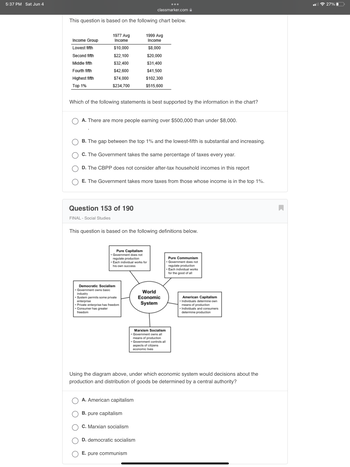
ENGR.ECONOMIC ANALYSIS
14th Edition
ISBN: 9780190931919
Author: NEWNAN
Publisher: Oxford University Press
expand_more
expand_more
format_list_bulleted
Question
Please I need answer to both

Transcribed Image Text:**Classmarker.com Educational Content Transcription**
**Question 152 of 190**
This question is based on the following chart below.
| Income Group | 1977 Avg Income | 1999 Avg Income |
|--------------|-----------------|-----------------|
| Lowest fifth | $10,000 | $8,000 |
| Second fifth | $22,100 | $20,000 |
| Middle fifth | $32,400 | $31,400 |
| Fourth fifth | $42,600 | $41,500 |
| Highest fifth | $74,000 | $102,300 |
| Top 1% | $234,700 | $515,600 |
**Which of the following statements is best supported by the information in the chart?**
- ( ) A. There are more people earning over $500,000 than under $8,000.
- ( ) B. The gap between the top 1% and the lowest-fifth is substantial and increasing.
- ( ) C. The Government takes the same percentage of taxes every year.
- ( ) D. The CBPP does not consider after-tax household incomes in this report.
- ( ) E. The Government takes more taxes from those whose income is in the top 1%.
---
**Question 153 of 190**
This question is based on the following definitions below.
(There is a diagram titled "World Economic System" showing different economic systems. Below is a detailed description of its content.)
- **Pure Capitalism**
- Government does not regulate production
- Each individual works for his own success
- **Pure Communism**
- Government does not regulate production
- Each individual works for the good of all
- **Democratic Socialism**
- Government owns basic industry
- System permits some private enterprise
- Private enterprise has freedom
- Consumer has greater freedom
- **American Capitalism**
- Individuals determine own means of production
- Individuals and consumers determine production
- **Marxism Socialism**
- Government owns all means of production
- Government controls all aspects of citizens' economic lives
Using the diagram above, under which economic system would decisions about the production and distribution of goods be determined by a central authority?
- ( ) A. American capitalism
- ( ) B. Pure capitalism
- ( ) C. Marxian socialism
-
Expert Solution
This question has been solved!
Explore an expertly crafted, step-by-step solution for a thorough understanding of key concepts.
This is a popular solution
Trending nowThis is a popular solution!
Step by stepSolved in 2 steps

Knowledge Booster
Learn more about
Need a deep-dive on the concept behind this application? Look no further. Learn more about this topic, economics and related others by exploring similar questions and additional content below.Similar questions
Recommended textbooks for you

 Principles of Economics (12th Edition)EconomicsISBN:9780134078779Author:Karl E. Case, Ray C. Fair, Sharon E. OsterPublisher:PEARSON
Principles of Economics (12th Edition)EconomicsISBN:9780134078779Author:Karl E. Case, Ray C. Fair, Sharon E. OsterPublisher:PEARSON Engineering Economy (17th Edition)EconomicsISBN:9780134870069Author:William G. Sullivan, Elin M. Wicks, C. Patrick KoellingPublisher:PEARSON
Engineering Economy (17th Edition)EconomicsISBN:9780134870069Author:William G. Sullivan, Elin M. Wicks, C. Patrick KoellingPublisher:PEARSON Principles of Economics (MindTap Course List)EconomicsISBN:9781305585126Author:N. Gregory MankiwPublisher:Cengage Learning
Principles of Economics (MindTap Course List)EconomicsISBN:9781305585126Author:N. Gregory MankiwPublisher:Cengage Learning Managerial Economics: A Problem Solving ApproachEconomicsISBN:9781337106665Author:Luke M. Froeb, Brian T. McCann, Michael R. Ward, Mike ShorPublisher:Cengage Learning
Managerial Economics: A Problem Solving ApproachEconomicsISBN:9781337106665Author:Luke M. Froeb, Brian T. McCann, Michael R. Ward, Mike ShorPublisher:Cengage Learning Managerial Economics & Business Strategy (Mcgraw-...EconomicsISBN:9781259290619Author:Michael Baye, Jeff PrincePublisher:McGraw-Hill Education
Managerial Economics & Business Strategy (Mcgraw-...EconomicsISBN:9781259290619Author:Michael Baye, Jeff PrincePublisher:McGraw-Hill Education


Principles of Economics (12th Edition)
Economics
ISBN:9780134078779
Author:Karl E. Case, Ray C. Fair, Sharon E. Oster
Publisher:PEARSON

Engineering Economy (17th Edition)
Economics
ISBN:9780134870069
Author:William G. Sullivan, Elin M. Wicks, C. Patrick Koelling
Publisher:PEARSON

Principles of Economics (MindTap Course List)
Economics
ISBN:9781305585126
Author:N. Gregory Mankiw
Publisher:Cengage Learning

Managerial Economics: A Problem Solving Approach
Economics
ISBN:9781337106665
Author:Luke M. Froeb, Brian T. McCann, Michael R. Ward, Mike Shor
Publisher:Cengage Learning

Managerial Economics & Business Strategy (Mcgraw-...
Economics
ISBN:9781259290619
Author:Michael Baye, Jeff Prince
Publisher:McGraw-Hill Education